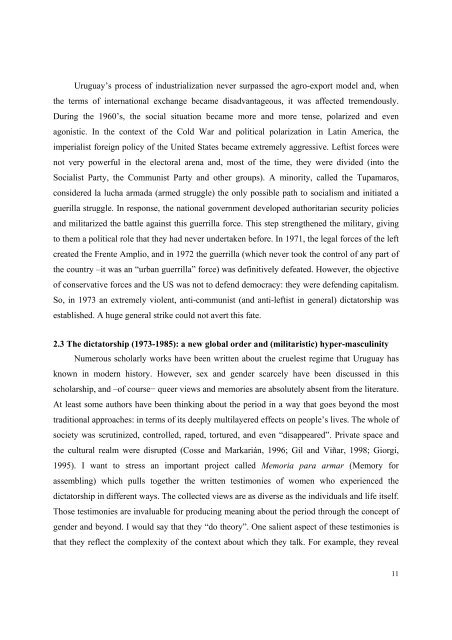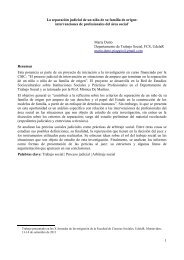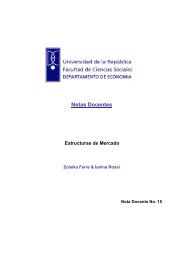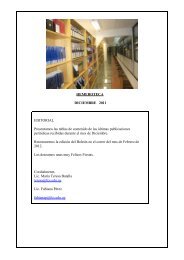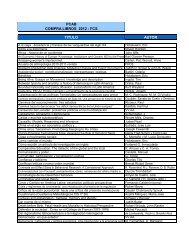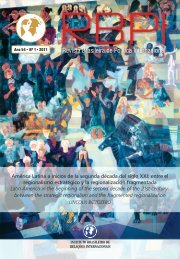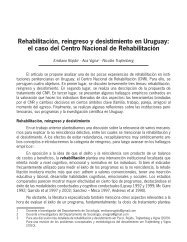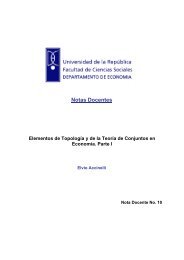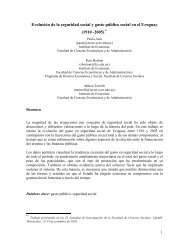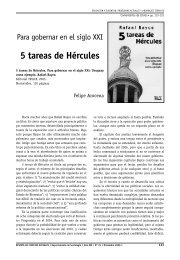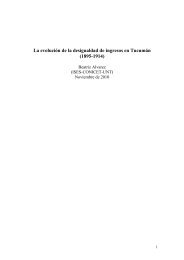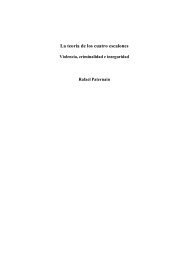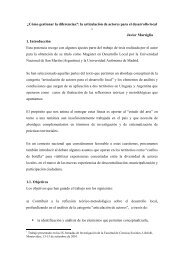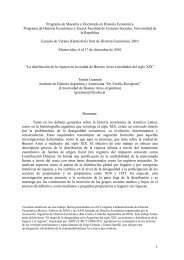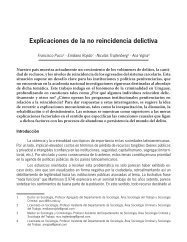Paulo Ravecca - Facultad de Ciencias Sociales
Paulo Ravecca - Facultad de Ciencias Sociales
Paulo Ravecca - Facultad de Ciencias Sociales
You also want an ePaper? Increase the reach of your titles
YUMPU automatically turns print PDFs into web optimized ePapers that Google loves.
Uruguay’s process of industrialization never surpassed the agro-export mo<strong>de</strong>l and, when<br />
the terms of international exchange became disadvantageous, it was affected tremendously.<br />
During the 1960’s, the social situation became more and more tense, polarized and even<br />
agonistic. In the context of the Cold War and political polarization in Latin America, the<br />
imperialist foreign policy of the United States became extremely aggressive. Leftist forces were<br />
not very powerful in the electoral arena and, most of the time, they were divi<strong>de</strong>d (into the<br />
Socialist Party, the Communist Party and other groups). A minority, called the Tupamaros,<br />
consi<strong>de</strong>red la lucha armada (armed struggle) the only possible path to socialism and initiated a<br />
guerilla struggle. In response, the national government <strong>de</strong>veloped authoritarian security policies<br />
and militarized the battle against this guerrilla force. This step strengthened the military, giving<br />
to them a political role that they had never un<strong>de</strong>rtaken before. In 1971, the legal forces of the left<br />
created the Frente Amplio, and in 1972 the guerrilla (which never took the control of any part of<br />
the country –it was an “urban guerrilla” force) was <strong>de</strong>finitively <strong>de</strong>feated. However, the objective<br />
of conservative forces and the US was not to <strong>de</strong>fend <strong>de</strong>mocracy: they were <strong>de</strong>fending capitalism.<br />
So, in 1973 an extremely violent, anti-communist (and anti-leftist in general) dictatorship was<br />
established. A huge general strike could not avert this fate.<br />
2.3 The dictatorship (1973-1985): a new global or<strong>de</strong>r and (militaristic) hyper-masculinity<br />
Numerous scholarly works have been written about the cruelest regime that Uruguay has<br />
known in mo<strong>de</strong>rn history. However, sex and gen<strong>de</strong>r scarcely have been discussed in this<br />
scholarship, and –of course− queer views and memories are absolutely absent from the literature.<br />
At least some authors have been thinking about the period in a way that goes beyond the most<br />
traditional approaches: in terms of its <strong>de</strong>eply multilayered effects on people’s lives. The whole of<br />
society was scrutinized, controlled, raped, tortured, and even “disappeared”. Private space and<br />
the cultural realm were disrupted (Cosse and Markarián, 1996; Gil and Viñar, 1998; Giorgi,<br />
1995). I want to stress an important project called Memoria para armar (Memory for<br />
assembling) which pulls together the written testimonies of women who experienced the<br />
dictatorship in different ways. The collected views are as diverse as the individuals and life itself.<br />
Those testimonies are invaluable for producing meaning about the period through the concept of<br />
gen<strong>de</strong>r and beyond. I would say that they “do theory”. One salient aspect of these testimonies is<br />
that they reflect the complexity of the context about which they talk. For example, they reveal<br />
11


